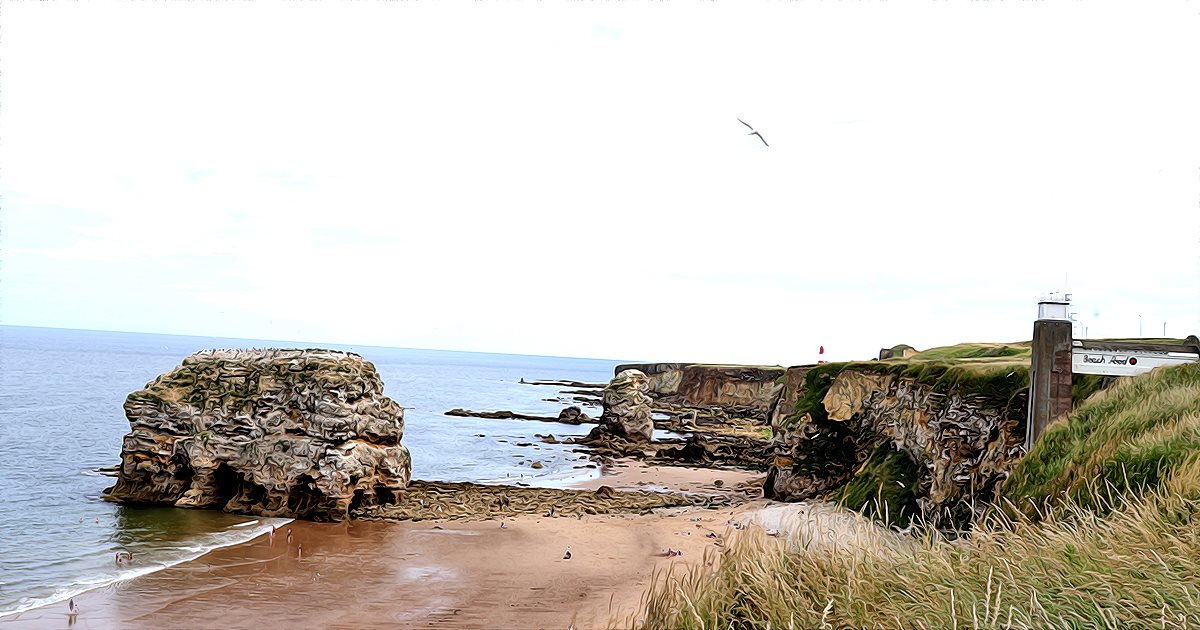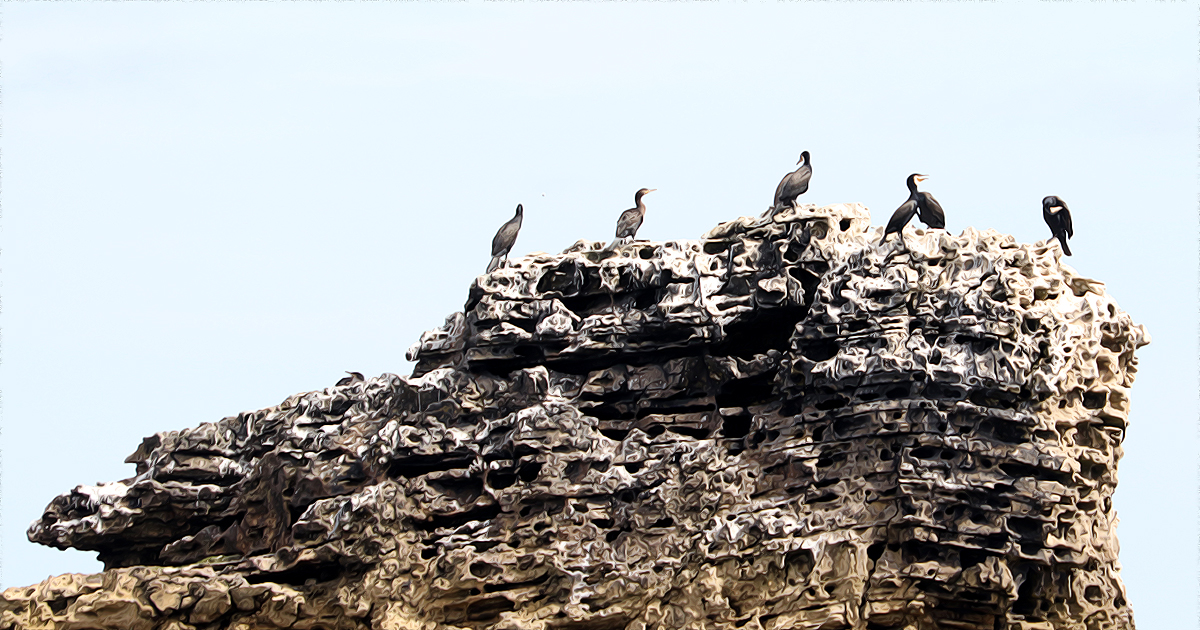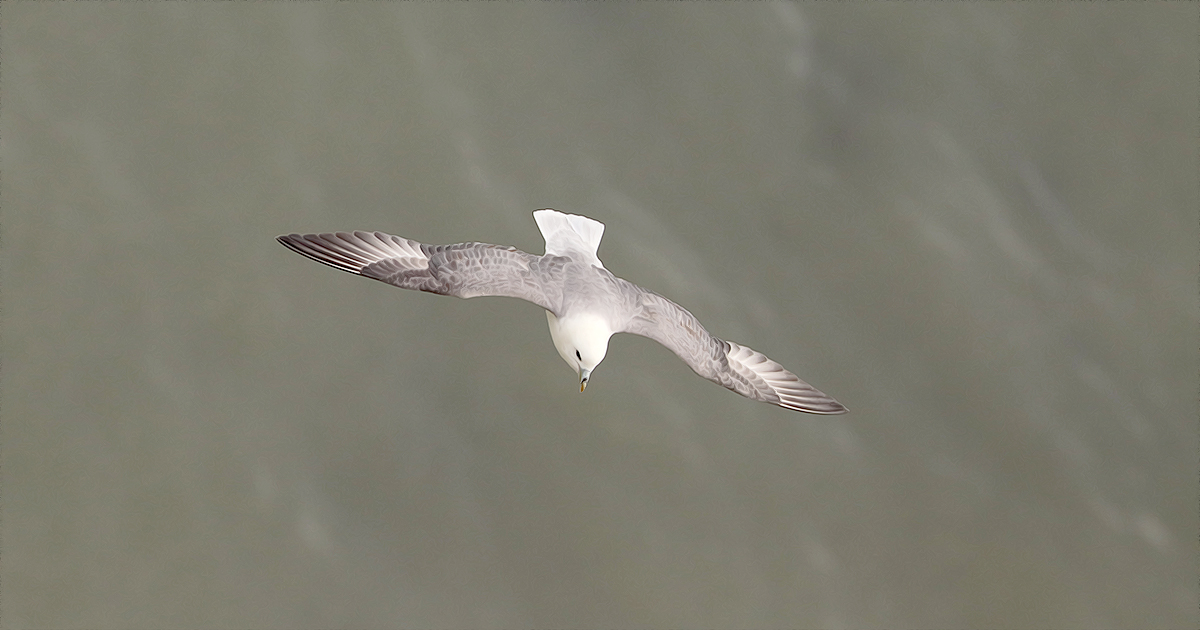“Home to colonies of seabirds in the spring and summer months.”
Marsden Rock is popular with tourists and local residents throughout the year. A wide variety of waders, which can include Bar-tailed Godwit, Curlew, Knot, Lapwing, Oystercatcher, Purple Sandpiper, Redshank, Ringed Plover Sanderling and Turnstone; are regularly present, especially during low tides. During the spring and summer months this scenic coastal habitat is filled with activity as hundreds of Kittiwakes, Cormorants and other seabirds such as Fulmars build their nests to help bring life to the next generation. Marsden is perfect location to experience breeding colonies of seabirds up close.

“A Huge colony of Kittiwakes nest on the sea cliffs,
with Cormorants also raising young on what remains of Marsden Rock”.
The main centerpiece, the Marsden Rock now stands smaller, as sections had to be demolished following a major collapse of the original structure.

A substantial portion of the rock remains, standing proud for all to enjoy. Cormorants nest high above; whilst Kittiwakes nest along the sides.
Cormorants on the very top
of Marsden Rock
Other species to watch out for as the seasonal clock turns include Guillemot, Puffin, Razorbill, Black-throated, Great Northern and Red-throated Divers, Red-necked and Slavonian Grebes, Eiders; and Common and Velvet Scoters.
Young Cormorants on Marsden Rock
 A car park is available adjacent to the Grotto which overlooks Marsden Rock. There are some stairs that travel from the car park to the beach. These are very steep, so care is recommended. The facilities at the Grotto can be accessed from the beach. At times there is a lift within the Grotto premises which can be accessed without the need to use the coastal steps. The lift is not always available however.
A car park is available adjacent to the Grotto which overlooks Marsden Rock. There are some stairs that travel from the car park to the beach. These are very steep, so care is recommended. The facilities at the Grotto can be accessed from the beach. At times there is a lift within the Grotto premises which can be accessed without the need to use the coastal steps. The lift is not always available however.
As well as Meadow Pipit and Skylarks; Rock Pipits are common. Stonechats can also be found at times, with Redstart and Whinchat passing through during their migration from their summer inland breeding sites. With the benefit of a telescope many more of Marsden’s regulars can be enjoyed such as Gannet, Arctic, Common & Sandwich Terns, Guillemot, Razorbill or Puffin, Manx and if your very lucky in present times a Sooty Shearwater. Arctic, Great and Pomarine Skuas are less common nowadays, but are still regularly recorded throughout the year.
 A pair of Razorbills
A pair of Razorbills
“Marsden can be a great site for close views for Fulmar, Puffin, Razorbill or Gannet“.
Less common species include Lapland Bunting, Shore Lark, Snow Bunting and Twite. Marsden Rock and the surrounding coastal habitat, is one of the best birdwatching sites, on Tyneside to view a HUGE variety of coastal species.
Migrants include Wheatear and Redstarts, during the spring and autumn. On occasions, less common birds come to visit, as they are blown off course during storms or as they wander into the UK on their travels during migration.
Not only is Marsden an amazing site to visit, with very good facilities, down below on the beach for the whole family, but there are an extensive series of walks along the cliff tops. Great for landscape photography. Birdwatching can be a great hobby to help keep fit, with long relaxing walks out in the fresh air.
A Fulmar

Further down the coast at Whitburn there is a popular seawatching hide. Car parking for this is available close to the Seaburn Lighthouse and coastal walk. Keys for the bird hide are available to purchase from the lighthouse. Whitburn is famous for a small group of dedicated birdwatchers, that contribute to the recording of seabirds all year round. Over the past thirty years, sadly everyone has experienced dramatic declines in many sea birds such as Shearwaters and Skuas.
County
South Tyneside
Habitats
Coastal
A Kittiwake nesting on a sea cliff
Access
There is free access to the coastal shore and surrounding cliffs. There are some stairs which travel from the beach below to the car park, which is adjacent to the Marsden Grotto pub.
Facilities
Food, drinks and toilets are available for customers at the Marsden Grotto
Parking
There is parking available which adjacent to the Marsden Grotto.
Further Information
Further information regarding the birds recorded at Marsden Rock, is available from The Durham Bird Club. The club publishes an annual report of species recorded in County Durham for a reasonable price.








